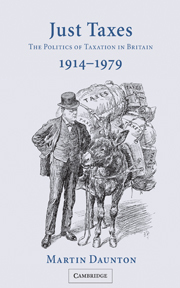Book contents
- Frontmatter
- Contents
- List of figures
- List of tables
- Preface
- List of abbreviations
- 1 The taxing state: an introduction
- 2 ‘The limits of our taxable capacity’: war finance, 1914–1918
- 3 ‘This hideous war memorial’: debt and taxation, 1918–1925
- 4 ‘Adjusting the particular turns of the different screws’: reforming the income tax, 1920–1929
- 5 ‘The great conflict of modern politics’: redistribution, depression and appeasement, 1929–1939
- 6 ‘The exigency of war’: taxation and the Second World War, 1939–1945
- 7 ‘The mortal blows of taxation’: Labour and reconstruction, 1945–1951
- 8 ‘A most injurious disincentive in our economic system’: Conservatives and taxation, 1951–1964
- 9 ‘Modern and dynamic economic policy’: Labour and taxation, 1951–1970
- 10 Rethinking taxation policy: from an opportunity state to an enterprise society, 1964–1979
- 11 ‘Highly defensible ramparts’: the politics of local taxation
- 12 Conclusion
- Appendix: chancellors of the Exchequer and prime ministers, 1908–1983
- Bibliography
- Index
6 - ‘The exigency of war’: taxation and the Second World War, 1939–1945
Published online by Cambridge University Press: 23 December 2009
- Frontmatter
- Contents
- List of figures
- List of tables
- Preface
- List of abbreviations
- 1 The taxing state: an introduction
- 2 ‘The limits of our taxable capacity’: war finance, 1914–1918
- 3 ‘This hideous war memorial’: debt and taxation, 1918–1925
- 4 ‘Adjusting the particular turns of the different screws’: reforming the income tax, 1920–1929
- 5 ‘The great conflict of modern politics’: redistribution, depression and appeasement, 1929–1939
- 6 ‘The exigency of war’: taxation and the Second World War, 1939–1945
- 7 ‘The mortal blows of taxation’: Labour and reconstruction, 1945–1951
- 8 ‘A most injurious disincentive in our economic system’: Conservatives and taxation, 1951–1964
- 9 ‘Modern and dynamic economic policy’: Labour and taxation, 1951–1970
- 10 Rethinking taxation policy: from an opportunity state to an enterprise society, 1964–1979
- 11 ‘Highly defensible ramparts’: the politics of local taxation
- 12 Conclusion
- Appendix: chancellors of the Exchequer and prime ministers, 1908–1983
- Bibliography
- Index
Summary
… whether we remain at home in relative safety, or whether we pass across the narrow water to fight, we must all live and work with a responsibility for the continuation of the struggle upon our shoulders. I can only hope that the careful reflection of the economist and the financial expert … may help, in some tiny degree, to sustain our common burden.
E. F. M. Durbin, How to Pay for the War: An Essay on the Financing of War (London, 1939), pp. 20–1The First World War marked a major increase in fiscal extraction, yet the main features of the fiscal constitution survived – dependence on progressive direct taxation and the rejection of both a sales tax and taxation of business profits. The outbreak of the Second World War placed new strains on the fiscal constitution. As with the First World War, the level of taxation was displaced with a further increase from 25.2 per cent of national income in 1938 to 44.7 per cent in 1944; it was still 44 per cent in 1948/9. This increase in the level of extraction was linked with a renegotiation of the fiscal constitution. During the First World War, the government was heavily dependent on loans, which led to inflation and to difficulties of postwar debt service. Could these issues be averted during the Second World War, by a greater reliance on taxation and lower levels of debt? However, reliance on taxation posed other problems.
- Type
- Chapter
- Information
- Just TaxesThe Politics of Taxation in Britain, 1914–1979, pp. 176 - 193Publisher: Cambridge University PressPrint publication year: 2002



